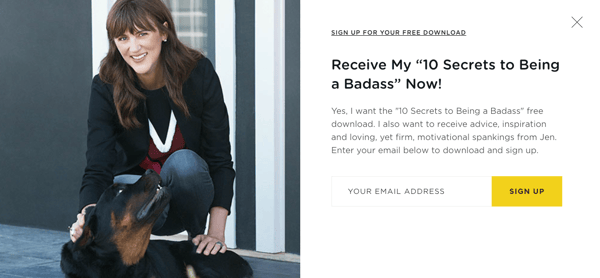Finally seeing the nonfiction manuscript you spent months — or years — writing turn into a published book can feel like crossing the finish line of a long and exhausting marathon. But while you have just achieved an incredibly rewarding milestone, the race is not quite over yet. Because now you’ve got to let the big, wide world know that your book actually exists. In other words, it’s time to learn how to market your book.
Now, for the purposes of this post, we’ll assume you know how to write a nonfiction book and that you have your nonfiction marketing basics covered: your mailing list, your blog, and your finely tuned product copy.
We’re going one step further and identifying four marketing “power tools” — resources sure to help you get the job done. Each tool has its own unique benefit, so grab your toolbelt, and let’s get to work.
4 Nonfiction Marketing Tools
1. Quora
2. Lead Generators
3. Facebook Ads
4. Podcasts
1) Quora
“Be active on social media” is a marketing tip you will hear time and again. But that’s the thing about aphorisms: they’re true. Building up a social media presence is especially important for nonfiction authors.
This is because, at the end of the day, the crux of effective marketing for most authors (barring celebrities) will be to earn your readers’ trust and convince them that you are an authority on the topic they want to know more about.
If a reader sees your book in a store (whether online or brick-and-mortar), “picks it up,” and considers reading it — congratulations! You’ve already passed a series of tough publishing tests to get to this point, including finishing and publishing your book, to begin with, grabbing the attention of a reader, and then holding their attention long enough to consider purchasing your book.
But one more test remains: before you hit a home run and actually make a sale, the reader will likely search for it online.
And if you’re a nonfiction author, there’s a good chance that the reader will type your name into Google. Building up an online profile will ensure that there will be results for readers to find — your blog, your Twitter or Facebook account, your website, etc. — should they get to this point where they want to learn more about you.
Okay, so we’ve established why having a digital presence is important. So why did I zero in on Quora?
Well, ideally, your nonfiction book will solve some kind of problem for people — whether that problem is as vague as learning the basics of business or as specific as a how-to for seasonal flower arranging.
Quora is literally full of people seeking answers to both broad and niche questions.
Look for questions that relate to your wheelhouse and start answering! The more you provide valuable feedback, the more you establish yourself as an authority, build a following of people who continuously look to your answers, and prove to prospective readers that you truly know what you’re talking about.
Not convinced? Well, let’s turn to numbers (they don’t lie).
This is the Vegan Food and Cuisine topic page on Quora. It’s currently followed by 260k people. One of the “Most-Viewed Writers” on this topic is Shuchi Agrawal, a vegetarian nutrition expert and creator of chezshuchi.com. She has nearly 9k followers on Quora. By actively monitoring her “space” on Quora and answering questions like “How does Vedic culture dictate food habits in India?” and “What are the various factors to be considered in planning meals for a family?” she has managed to build a following who trust her as a resource on vegan cooking. If she ever wanted to publish a cookbook, she’d already have a built-in audience.
Need a nonfiction marketing tool that’s free and easy to use? Drill into Quora and start reaching your target audience.
2) Lead Generators
Give an author a fish, and you feed them for a day; teach an author how to create lead generators, and they build a mailing list that will keep collecting loyal readers for years to come. Or so the old adage goes.
A lead generator, often also referred to as a “lead magnet,” is something you offer readers in exchange for their contact information — thus turning them into a “lead” you can reach out to the next time you want to promote something.
Below is a perfect example of a lead generator on the author of You Are a Badass Jen Sincero’s website:

If people land on Jen’s website, it’s likely that they will be similarly interested in becoming a badass and will exchange their email — something we do constantly these days — without a second thought. And the next time Jen publishes a book, she’ll already have a list of people to market it directly to.
To get started on your own lead generator, think of something you can offer readers that relates to your area of expertise. For instance, if your target readers are people who do at-home workouts, offer them a download of ten exercises they can do from their living room. Or, if your book is about entrepreneurship, offer a PDF of ten morning rituals for increasing productivity.
The good news is that, from a technical standpoint, lead generators are easy enough to create. Most self-service web design tools, such as Wix or Squarespace, will offer a plug-in for creating a magnet.
If the task at hand is “building a focused mailing list of readers,” create an amazing lead generator. Accept no substitutes.
3) Facebook Ads
You might have mixed feelings about Facebook ads due to the way they sometimes hit a little too close to home. But advertising on Facebook is an excellent resource for authors — not just because of the potential sales it can deliver but also because you can learn a lot about your target audience.
Facebook allows you to choose the people you want to advertise to by offering a range of criteria such as geography, age, gender, interests, and other demographics such as work, studies, and device usage. So a wise move is to test your ads against different audiences to see which ones engage with your ads more.
Let’s say you’re a marketing expert and you’ve written a book on consumer behavior.
- You might direct one ad to marketing graduates who like Seth Godin.
- You can then test a second ad for marketing graduates who like the book Nudge by Richard H. Thaler and Cass R. Sunstein.
- Then perhaps you’ll test a third ad, but in this set, you’ll target people already working in marketing as opposed to graduates.
Making small tweaks to your ads this way allows you to really hone in on the people who will be most attracted to your book — and once you’ve found out which ads are most successful, you can eliminate the rest and just keep running those.
And remember, your actual book isn’t the only thing for you to advertise on Facebook. An even more popular choice for authors — one that is encouraged by Mark Dawson — is to advertise your mailing list. And this is where that lead magnet will come in handy again! You can create an ad that promotes a free ebook or something similar and then have that ad link to a page on your website where people enter their email to receive the free item. Now you’ve not only got a new lead but a new reader as well!
When you absolutely, positively need to reach target readers at scale, Facebook ads are the nuts and bolts that won’t let you down.
4) Podcasts
Podcasts are big these days, and they’re getting bigger. In fact, 32% of Americans listen to podcasts at least once a month. And here are some more numbers for you: there are 700,000 active podcasts right now (including IngramSpark’s very own Self-Publishing Podcast!), and more than 29 million podcast episodes in existence.
Now, why should these stats matter to you? Well, as the author of a published book, you now have authority on a subject matter, meaning you are exactly the kind of person that related podcasts will want to have on their show. And the scope of what you can talk about as a published author is large. You can pitch yourself as someone who knows not only about your specific topic but also about the editing process, publishing process, research strategies — and maybe even marketing when you’re done trying out these tips!
There are a number of different platforms you can search for podcasts on Apple Podcasts, Spotify, Stitcher, Overcast, Google Podcasts, and Pocket Casts, to name a few. The list goes on. Or you can even just write your topic and the word “podcast” into a Google search, and you’ll likely be flooded with results. Find podcasts that relate in some way to your book or your experience as an author, and pitch yourself a guest on their show. The host will inevitably end up plugging your book in order to demonstrate to readers that their guest has got cred.
Looking to build your subject-matter authority? Tool up with some podcast appearances (or craft a show of your own).
At this point, your toolbelt is well-stocked with marketing power tools for you to try out. Just be aware that some tools will work better than others for you. Marketing, just like writing a book, is a long game of throwing stuff at the wall to see what sticks. So be patient, be determined, and before long, you will find out which tools are right for you.













